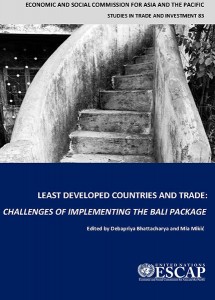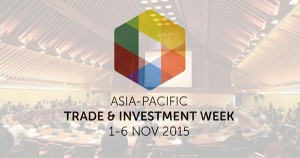2 December 2015, Bangkok: Dr Debapriya Bhattacharya, Chair of Southern Voice and Distinguished Fellow, Centre for Policy Dialogue (CPD), called for stronger…
Originally posted on the ESCAP website on Tuesday, 3 November 2015.
Least Developed Countries and Trade: Challenges of Implementing the Bali Package
(Studies in Trade and Investment No. 83). Edited by Debapriya Bhattacharya and Mia Mikić
This monograph explores the challenges faced in implementing the Bali package by LDCs in WTO. It provides an analysis of the key decisions, and identifies opportunities and, in certain cases, outlines strategies for assessing the impacts. The important aspects of this publication relate to policy advisory with regard to the preparedness of LDCs as a group for successful negotiations at WTO. At the same time, given the high trade costs facing the LDCs, the study rightly suggests that they must capitalize on the successful implementation of the Trade Facilitation Agreement.
Moreover, the study identifies the gaps in LDC capacities, and articulates the needs in terms of national and regional policies as well as capacity-building programmes for helping them to implement the Ministerial decisions in favour of the LDCs. The study also draws attention to what should be done towards achieving the finalization of the Doha Development Agenda Work Programme and the ongoing WTO negotiations.
Dr Debapriya Bhattacharya made a presentation on the launching of the UNESCAP report “Least Developed Countries and Trade: Challenges of Implementing the Bali Package,” on 3 November, prior to the Expert Group Meeting on Trade Policies for Sustainable Development held during 3-4 November 2015 in Bangkok, Thailand.
The meet, as part of the fourth session of the Committee on Trade and Investment, was held at the United Nations Conference Centre (UNCC) in Bangkok during the fourth Asia-Pacific Trade and Investment Week.
Dr Bhattacharya was also a panelist at the session on “Trade for Post-2015 Sustainable Development: Are we getting it right?” with other panelists Raed Safadi, Dubai Dept. of Economic Development and Ben Shepherd, Developing-Trade Consultants and Saman Kelegama, Institute of Policy Studies (IPS), Sri Lanka. The session, moderated by Susan Stone, ESCAP, explored the role of trade in the Post-2015 agenda and assessed whether the international community is on the path of utilising trade for development.
Other sessions on the following day were “Financing Trade and Trade Facilitation: Beyond Aid for Trade,” moderated by Jean-Bertrand Azapmo, MTEC; “Building a Global Trading System fit for SDGs: Nairobi and Beyond, moderated by Mia Mikic, ESCAP; “Better Trade and Investment Statistics for Better Policies, moderated by Saman Kelegama, IPS; and “Trade Data and SDGs Targets and Indicators: Issues and Options,” moderated by Mondher Mimouni, ITC.
.
.
.
.



